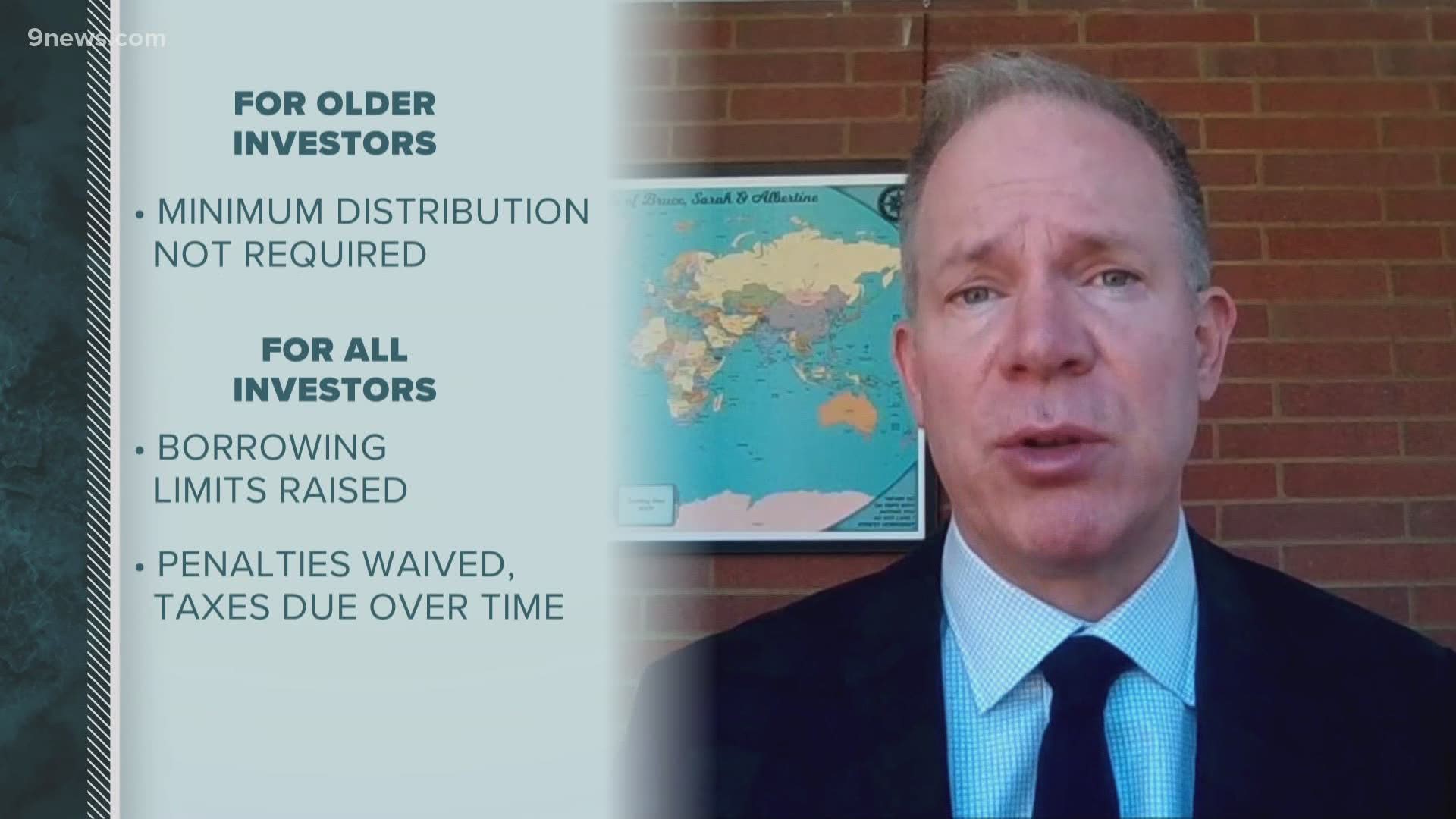DENVER — Tens of thousands of Coloradans have lost their jobs due to the COVID-19 pandemic, and nearly everyone is facing financial uncertainty amid this unprecedented situation.
That’s why we asked 9NEWS Financial Analyst Bruce Allen, University of Denver Associate Professor of Finance Chris Hughen and Metro State University of Denver Assistant Director of Finance Alex Fayman for their answers to some of the most common financial questions we’ve received.
Do you still have questions? Text us at 303-871-1491.
Some credit card companies are waiving fees or accepting late payments. Will late or missed payments negatively affect credit scores down the line?
Hughen: First of all, it varies tremendously based on the lender. I have numerous tips for talking with lenders right now in today’s environment.
The first thing you need to do is talk to your lender. You don’t want to wait until they call you. Be proactive and talk to them first. Talk to them sooner rather than later; many of them are overwhelmed right now and have a tough time trying to get back to people, but you want to be very proactive in talking to them first.
I would also research your lender first before talking to them. This is really important because if you do some simple Google searches, you can figure out what terms are being offered to other people and do a successful negotiation with them.
It is absolutely true that lenders are treating people differently. Some are deferring payments, some aren’t charging late fees, some are lowering interest payments. It’s really important to doing research first.
If you’ve been able to defer payments, what should you do now to prepare for when you have to pay up in a few months?
Hughen: Unfortunately there are a number of financial struggles that people face. Some people are of course getting checks from the government. Some people are wondering what to do with it: Should they pay down debt, should they keep it in cash savings? If anybody is experiencing stress … they need to avoid paying down debt right now, make sure you have enough cash to get through current struggles.
Another important issue is FOMO [fear of missing out]. FOMO is huge right now since the stock market has made a massive comeback since late March. Now is not the time to stretch yourself to invest in the stock market.
Make sure you have enough cash. My best tip is for people is to pick up the phone right now, open your calendar and make an appointment with yourself six months from now. Now is not the time to develop a long-term financial plan, but six months from now when things have stabilized and your employment situation is more clear, you should set an appointment with yourself to make sure you have a plan for financial success in the future that you can commit to.
When should you borrow from retirement accounts and what are the penalties?
Allen: The CARES Act, which was passed at the end of March, allows people to do three different things to help preserve their financial status.
The first is for older investors taking a required minimum distribution. These are people that have an IRA or a 401K type plan who are over 70 and sometimes 72 that do not have to take the required minimum distribution.
The second if, they’re in dire circumstances, the borrowing limits have been raised and they don’t have to make a repayment on the loan for the first year.
Lastly, if they’re in really dire circumstances and they have an emergency, the CARES Act has provided that people can withdraw up to $100,000 from their IRA or 401K plans and pay back the taxes over three years. If they pay that back … they don’t have to pay taxes on that plan.
Previously, if you took $100,000 out of a 401K plan you would have to pay 10% plus taxes, now you can take out up to $100,000 without the 10% penalty and taxes are due over three years.
What should you do with your 401K right now?
Allen: I think there are a couple of things. As far as contributions, there are two things to consider. One is, should you continue to make contributions to your 401K plan? And two is, what should you be doing with your investments?
If you’ve built a strategy in your 401K plan … stay with that. Markets are volatile and go up and down, but that dollar-cost averaging through volatile markets, you respect them whether you’re buying very conservative investments or very volatile investments, like stocks that can really benefit you when this crisis is over.
And we've gone through very bad drops in the markets every 10 years lately, and when that happens, those people that stay with their financial plan and continue to invest in stocks, especially as they decline, are very well-rewarded for that long-term thinking.
So plan for 10 to 20 years from now, and do not think about the next month as the stock market declines. Stay with your financial plan — that’s the key to getting through this crisis.
Number two, in terms of 401K strategy for people that have a long time to live before they retire, it’s important they not change their asset allocation, not change their investments in the midst of this environment, because staying with your financial plan is critical. People who liquidate big stocks in the middle of a crisis usually regret that, and people that stay with their financial plan are well-rewarded, and people who increase their contributions and contribute more to stocks are very well-rewarded.
Should people be changing strategies as far as filing to get their social security?
Allen: One of the strategies that many people have employed over the last several years is to defer taking social security if you’re healthy and have other resources. People want to wait until they’re 70 because the social security benefit increases each year they postpone taking security.
That’s a decision now that may want to be revisited – especially if someone is in extreme financial circumstances and now needs to file for social security. This is a complicated topic because when you decide to take social security benefits is contingent on your own health and whether you financially need to take on social security right now.
Now some people may be forced to claim social security because they’ve lost a job or they may have had their hours reduced, and once you’ve claimed social security, there are channels that allow you to unwind the decision later on. Claiming social security is a complicated decision and if you decide to take it, it’s best to consult with your financial advisor.
What should people do about their student loans? And should existing students worry about their scholarships being in jeopardy due to the crisis?
Hughen: You want to defer as much interest in principal payment as you possibly can. The good news about student loans is that it’s good debt. It’s debt that you’re taking on so you can invest in yourself. It’s not debt you have to rush to pay back, so take as much deferment as you possibly can.
Colleges are struggling right now … most universities are making every effort they can to keep their students enrolled, to defer payments and to give people the financial aid that they deserve.
It varies so much depending on the colleges and universities, but I have not heard of any specific news about scholarships being in jeopardy.
Fayman: From the information I have, the scholarship money that was on the table is still there for students to obtain. I would recommend not delaying submitting applications for scholarships you are eyeing.
If you are a student I would not put applying for a scholarship on the back burner this particular go around. And try to understand that maybe because more people are going to be facing economic hardships, definitely put your best foot forward in those documents. Not only submit them early but also consider the fact that your competition may be greater for those funds.
If the situation that we're in does not last in the coming 6 months, does not last beyond the next year, the scholarship money should be there, but if this is going to be a persistent downtrend we find ourselves in, it's possible that scholarship funds are going to be in jeopardy, yes.
For students about to graduate, what advice can they take as they move into a workforce that has 26 million people out of work? What should they do if they are worried about loans they have to pay after they leave college when they might not be able to find work?
Fayman: Finding yourself in this situation as a student is difficult. The reason why you're getting a degree from a university is so that you are able to get hired and able to get a job down the line. MSU is special because most of our students are employed and have full-time and part-time jobs and go from those jobs to the classroom to fulfill their dreams.
There's not going to be one answer that will fit every situation. I've had students write to me and talk about how they are a waiter at a bar and the bar is closed and that is how they paid bills while trying to get through school.
I would try to look into the support you can get from the university. I would look into the support you can get from the state through the CARES Act, which provides various types of benefits to those that have lost their job. Most importantly, the advice is to stay positive. Try to remember it’s a period of time. The U.S. economy has faced difficult times in the past and always ended up stronger after those setbacks are left behind. So you need to, as a student, to try to remember what your goal was. To get an education, a degree, to make yourself marketable for a normal job environment, which we're not in right now.
If there's any way you can right now get help from the government, family, university, you can get through this period without losing sight of your goal.
What should we start thinking about now for when we are out of the pandemic and back to “normal” life?
Hughen: It’s so easy to forget about your financial plans when times are good, and you really want to sit down and develop a long-term plan. A couple of goals are important. You want to make sure you are regularly paying down your debt, that should be a priority when our financial situation is normalized.
Also, make sure you have cash reserves. There are times that show us how important it is to set aside six months of living expenses and not touch it until you have a financial crisis.
The other thing is to regularly put aside money into the stock market or long-term investments. Over a long period of time, the stock market has provided an annual return of 9.6%. You have to avoid being sensitive to the ups and downs, and focus on what happens in an extended period of time.
If they’ve held their investments over a 20-year period of time, they almost never lost money. So focus on a long-term holding of long-term investments.
Fayman: I think that the number one thing is staying positive, number two is moving forward with educational goals and number three is doing everything you can financially, such as paying minimum credit card payments and contacting any lender you can.
If you are not able to meet your obligations with a lender, still contact them, explain your situation, don’t just miss a payment -- everyone knows when you apply for a job you get background screens, criminal history, and also credit history. So, it is very important to sustain your credit history in a time like this.
SUGGESTED VIDEOS | Local stories from 9NEWS



